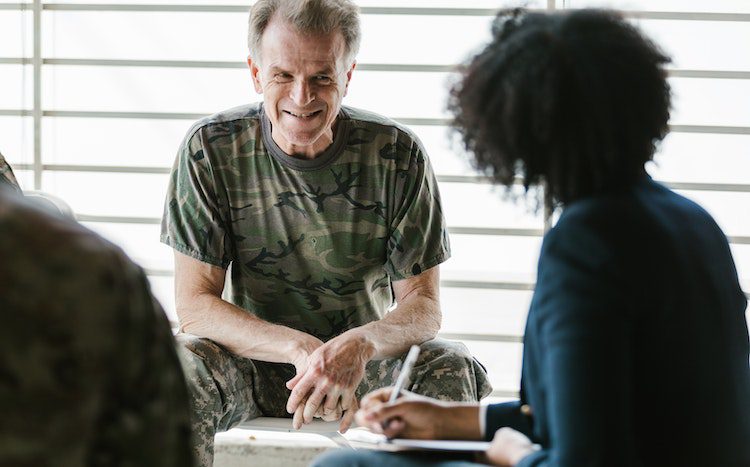 Substance and alcohol dependency has no boundaries. When certain risk factors are present, it’s not uncommon for someone to develop substance use disorder (SUD) or alcohol use disorder (AUD). While we don’t want to think of our brave military veterans suffering with either of these conditions, the reality is many service members have challenges with addiction.
Substance and alcohol dependency has no boundaries. When certain risk factors are present, it’s not uncommon for someone to develop substance use disorder (SUD) or alcohol use disorder (AUD). While we don’t want to think of our brave military veterans suffering with either of these conditions, the reality is many service members have challenges with addiction.
Statistics Are Only Part of the Story
According to the U.S. Department of Veteran Affairs (VA), in addition to specific health concerns related to time and area served, here’s a small sample of what veterans experience:
- Results from the 2015 VA Cooperative Study indicate that some Iraq and Afghanistan veteran respondents engage in non-suicidal self-harm, have sexual dysfunction, and suffer from depression.
- Another study looked at more than 40,000 Iraq and Afghanistan veterans who were diagnosed with PTSD and received VA mental health care between 2001 and 2011. Receiving prompt medical attention for the condition greatly improved chances of healing, while “For each year a veteran waited to initiate treatment, there was a 5 percent increase in the odds of their PTSD either not improving or worsening.”
- Another VA study reported that “41.5 percent of women and 4 percent of men experienced military sexual trauma.”
- Approximately 40 percent of veterans have been diagnosed with some form of mental health disorder or illness.
- Substance use disorders are “one of the five the most common mental health diagnoses impacting homeless veterans” states the VA. In general, more than one in 10 veterans have these disorders, ranking them “slightly higher than the general population,” according to the National Institute on Drug Abuse.
In a 2022 report, the VA notes that “of the on average 16.8 veteran suicides per day in 2020, approximately 39.7 percent (6.7 per day) were among recent veteran VHA users [Veterans Health Administration] and 60.3 percent (10.1 per day) were among other veterans.” In other words, accessing some form of treatment lowers likelihood of suicide, but more intervention is needed.
So, what will help veterans overcome addiction?
Reduce the Stigma
In an article for the Military Health System, clinical neuropsychologist Dorothy A. Kaplan explained that “mental health stigma in the military is strongly grounded in military culture and is linked to a desire to handle problems on one’s own. […] Interestingly, service members who report psychological health concerns are most likely to perceive stigma and anticipate negative outcomes for seeking care, including career harm.”
Further, Kaplan stated that “it’s critical that clinicians address stigma and attitudes about psychological health and help-seeking during the initial session with a new patient, as so many patients drop out of care after just a session or two.”
She indicated that some of veterans’ primary concerns involve:
- The perception of strength and self-reliance, which often stems not only from an individual belief system but also “traditionally masculine ideals” prevalent in the military, according to the American Psychological Association.
- Confidentiality and career worries, which is often more of a consideration among active personnel but still an issue for veterans working in certain industries.
- Thinking treatment for mental health issues, PTSD, and SUD/AUD won’t work, even though, as just one example, “there is a 70–80 percent recovery rate from PTSD in individuals who complete evidence-based treatment,” Kaplan noted.
- Mixed messages within the military organization regarding leaders’ support of behavioral health issues yet with an undercurrent of how treatment may impact operations, staffing, and other mission-critical situations.
Fortunately, initiatives such as the Real Warriors campaign and Give an Hour help to break the stigma associated with mental health issues and encourage current and former members of the military to seek help.
Other services offered by the VA include, but aren’t limited to:
Certain military branches also have specific health units, such as the Army’s Embedded Behavioral Health program or the Marine Corp Community Services’ behavioral health classes.
Foster Connection
A lack of military fellowship contributes a great deal to isolation, which compounds issues with addiction. However, these essential resources bridge the gap:
- Make the Connection helps veterans learn from each other through hundreds of shared experiences and stories of recovery.
- The Veterans Crisis Hotline (dial 988, then press 1, or seek out assistance by texting 838255) is available for free 24/7, 365 days a year and provides live support to veterans, families, and other caregivers.
- Lifeline for Vets, where veteran volunteers offer support to “veterans and their families who are enduring a crisis or who have a critical need for help”: 888-777-4443.
The Tactical Recovery Program at Great Oaks
We’re honored by your service—now let us honor you with the evidence-based care you deserve. Great Oaks Recovery Center outside of Houston is a certified Veteran Ready Healthcare Provider Organization by Psych Armor. Our Tactical Recovery program for veterans provides confidential and professional treatment, family programs, and aftercare tools to help individuals with SUD, AUD, PTSD, depression, and other mental health issues. Speak to one of our admissions experts today.



